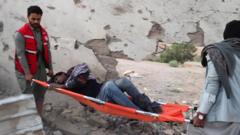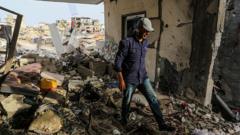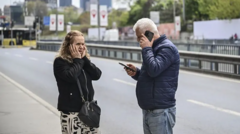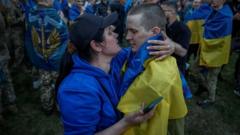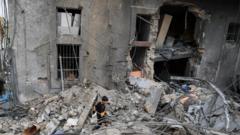Sherwan Sergeli and residents of Sergele are battling the impacts of Turkish military encroachment on their land, marking a stark reality of life in Iraq's 'Forbidden Zone.' As military operations escalate, civilian casualties increase, revealing the difficult relationship between the Kurdish region and Turkey.
The Struggle of Sergele: Life in Iraq's Turbulent 'Forbidden Zone'
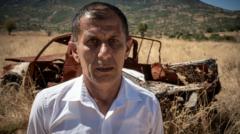
The Struggle of Sergele: Life in Iraq's Turbulent 'Forbidden Zone'
Villagers in Sergele, Iraqi Kurdistan face existential threats from expanding Turkish military bases amidst ongoing conflict with the PKK.
Nestled amidst the scenic mountains of Iraqi Kurdistan, the village of Sergele has long relied on its rich agricultural land for sustenance. Generations of residents grew pomegranates, almonds, and peaches while drawing on the bounty of the surrounding forests. However, this idyllic lifestyle has been threatened increasingly by the expanding Turkish military presence, which now surrounds the village. Situated just 16 kilometers (10 miles) from the Turkish border, Sergele has seen the construction of several military bases, rendering much of its fertile land off-limits.
"This is undoubtedly an occupation of Kurdish territory," asserts Sherwan Sergeli, a 50-year-old farmer who has losing access to his fields. The village finds itself at the heart of Turkey's conflict with the PKK (Kurdistan Workers' Party), which has waged an insurgency since 1984. Locally termed the "Forbidden Zone," this unsafe region stretches along the Iraqi border with Turkey, delving up to 40 kilometers (25 miles) deep and worsening an already precarious situation.
Human rights groups have reported civilian casualties resulting from airstrikes and drone attacks within this zone, with many residents of Sergele fearing for their safety. The heightened Turkish military activity has turned Sergele into an unwitting frontline in a war that affects not just farmers, but entire communities. Satellite imagery analyzed by the BBC highlights Turkey’s rapid military buildup in northern Iraq, with over 136 installations constructed to date and extensive road networks that have negatively impacted the environment.
The Turkish government defends its operations as necessary to combat the PKK, which it has labeled a terrorist organization. Behind the scenes, Iraq's fragmented leadership faces challenges in addressing Turkey's presence, often conceding to its military demands due to economic necessities, including reliance on Turkey for trade and water resources.
In nearby Kani Masi—once vibrant with agriculture—Turkey's military bases have suppressed life, forcing out many residents. Salam Saeed, a farmer whose vineyard lies close to a Turkish installation, lamented, "I haven't been able to cultivate my land in three years." The pressing presence of drones is a constant reminder of the simmering tensions.
Both Iraq's central government and the semi-autonomous Kurdistan Regional Government (KRG) have had complicated dealings with Turkey, often prioritizing strategic alliances over civilian safety. This precarious balance has resulted in many residents feeling abandoned amidst the conflict.
Despite calls from the PKK's leader for peace, Turkey has escalated its military actions, with the risk to civilians growing daily. The tragic case of Alan Ismail, a cancer patient who was killed in an airstrike last summer, underscores the dire consequences of this ongoing strife. Legal efforts to seek justice have been muddied by political considerations, and the families of victims often find themselves without recourse for accountability.
In a move that could amplify tensions further, Kurdish officials continue to downplay the consequences of Turkey's military activity, attributing civilian harm primarily to the PKK. Yet, as the situation deteriorates and the "Forbidden Zone" sprawls, Sergele's residents stand at a crossroads, caught between their fight for survival and the larger geopolitical dynamics at play in the region.

